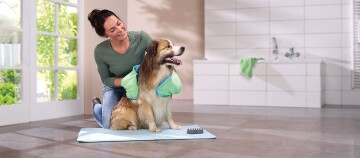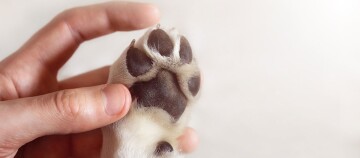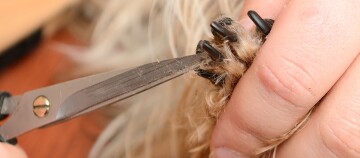Dental Care in Dogs: Correct Dog Dental Care and Tips Against Plaque
07.10.2022 - Reading time: 5 minutes
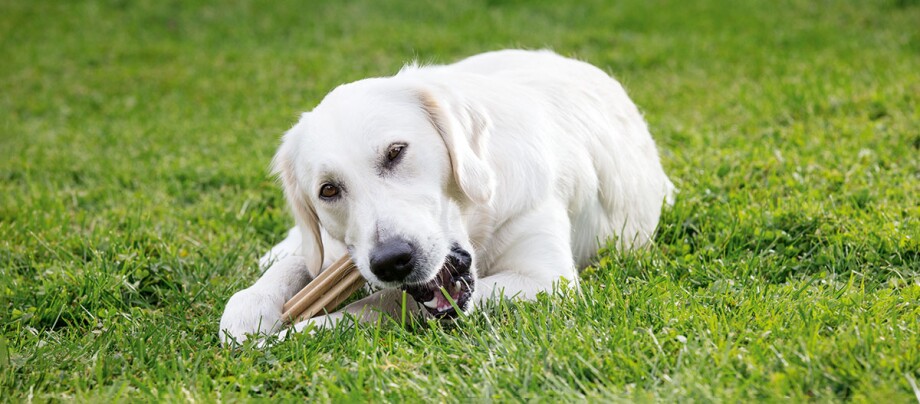
The dog's teeth serve as a means of expression, a weapon, a hunting instrument and a feeding tool all in one. That's why healthy teeth and dental care are vital for dogs. Find out here how to prevent plaque, tartar and gingivitis in your four-legged friend and about correct dog dental care.
Your dog's specialised dentition
The change of teeth occurs from the third to the sixth month of life – the puppies lose their milk teeth. No chair leg or shoe is safe from their nibbling during this time, which is their means of accelerating the (often painful) loss of their teeth.
After the change of teeth, an adult dog has 42 teeth for grasping, holding, killing and eating prey, as well as for tearing and chewing meat.
In certain dog breeds, some teeth are genetically atrophied or particularly short. While missing or small molars do not affect the health of the dogs, malpositioned teeth pose a health risk for our four-legged friends.
The muzzle of short-muzzled dogs is often too small for the number of teeth, which can lead to a failure of the milk teeth to fall out and to malpositioned teeth or even to periodontitis. A malpositioning of the teeth prevents the specific self-cleaning mechanisms of the dentition – resulting in the risk of gingivitis in the long run.
Did you know that dogs that get a lot of exercise are less likely to get periodontitis? This is because exercise promotes the flow of saliva, which in turn has a tooth-cleaning effect.
When is dental care necessary for dogs?
Bad teeth and inflamed gums are easy to diagnose. Are your four-legged friend’s teeth discoloured yellowish-brown or are there brown edges visible on the gums? If so, this is a serious alarm signal, because this is plaque and bacterial invasion. Does your dog have bad breath? If so, this is a clear indication of dental problems or gingivitis.
Prevent canine dental disease in time and incorporate dental care into your dog’s daily grooming routine.
Dental care will protect your dog from pain and disease
Statistically, 85% of all four-legged friends over the age of three experience dental problems. The vicious circle starts with the formation of a soft coating known as plaque. Plaque is caused by incorrect food, food remains on the teeth and the bacteria that accumulate there. With the minerals from the saliva, plaque hardens to become tartar.
It is best to remove soft plaque regularly yourself so that tartar and bacteria don’t stand a chance. Once tartar has formed, only a vet can remove it.
Once bacteria have settled in your dog’s mouth, they attack the gums and form gum pockets where germs can develop. This may result in gum and jaw bone recession – and in the worst case, teeth fall out.
Lack of dog dental care can lead to toothache, a refusal to eat and deficiency symptoms in your dog.
Dental care for dogs - natural polishing through chews and food
Dog dental care starts with the food. A meal of softened dry food or wet food gives your dog little to chew on. He simply swallows the small chunks or the soft mush.
Dogs that are fed fresh muscle meat have a lot more to chew, depending on the size of the meat chunks. This is where natural teeth cleaning begins. It is most effective when the dog is allowed to gnaw on the bone. During this chewing process, the surface of the dog’s teeth are cleaned automatically so that plaque and even tartar are removed. The increased flow of saliva produced during this process also helps.
Give your dog a large enough beef bone or coffee wood chew (so he doesn’t swallow it) to play with when he’s a puppy. You’ll be surprised how enthusiastic he is about gnawing. This is a great way to get him to clean his teeth, strengthen his jaws and just keep him busy. A fresh bone – make sure it is uncooked and never from chicken or pork – is a real treat for adult dogs.
Make sure your dog’s food and chews are sugar-free.
The Maxi Zoo online shop has a wide range of chewing items that are ideal substitutes for natural bones and brushing your dog’s teeth. We have compiled our food recommendations for healthy teeth here:
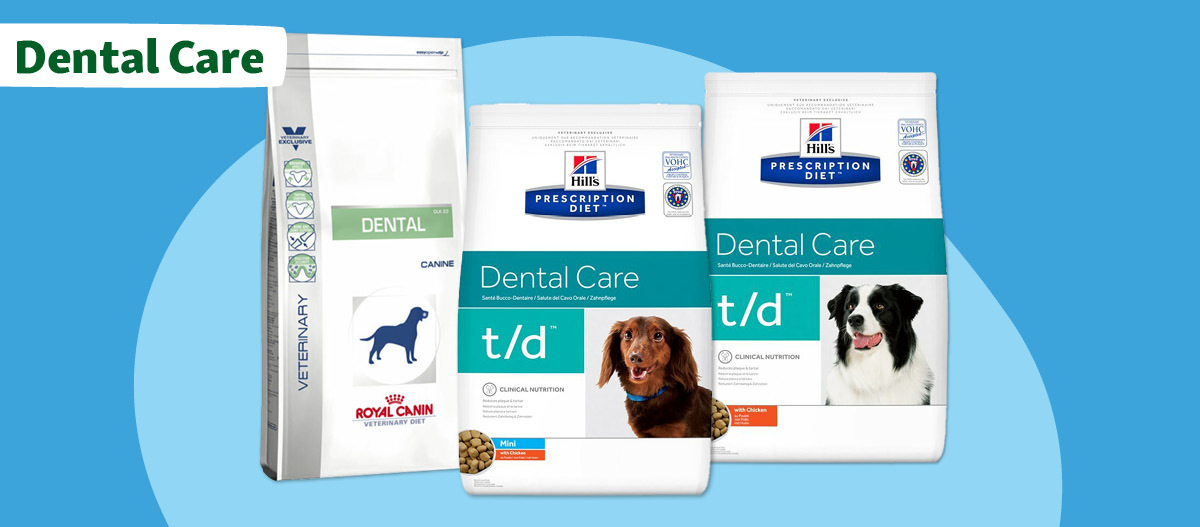
How does brushing the dog's teeth work?
Brushing your dog’s teeth – is it even possible? Yes, but you have to get your dog used to it while they are still a puppy. With a little practice, some adult dogs will be quite happy to allow their teeth to be brushed with special toothpastes.
Special toothbrushes designed for dogs’ teeth and dog-friendly toothpaste flavours actually makes the whole process quite easy.
Dental toys are also an excellent aid when it comes to dental care. They strengthen the jaw muscles, massage the gums and polish your dog’s teeth. Hard rubber toys also have this cleaning effect and are fun at the same time.
The Maxi Zoo online shop has a wide range of helpful dental care products for your dog.
